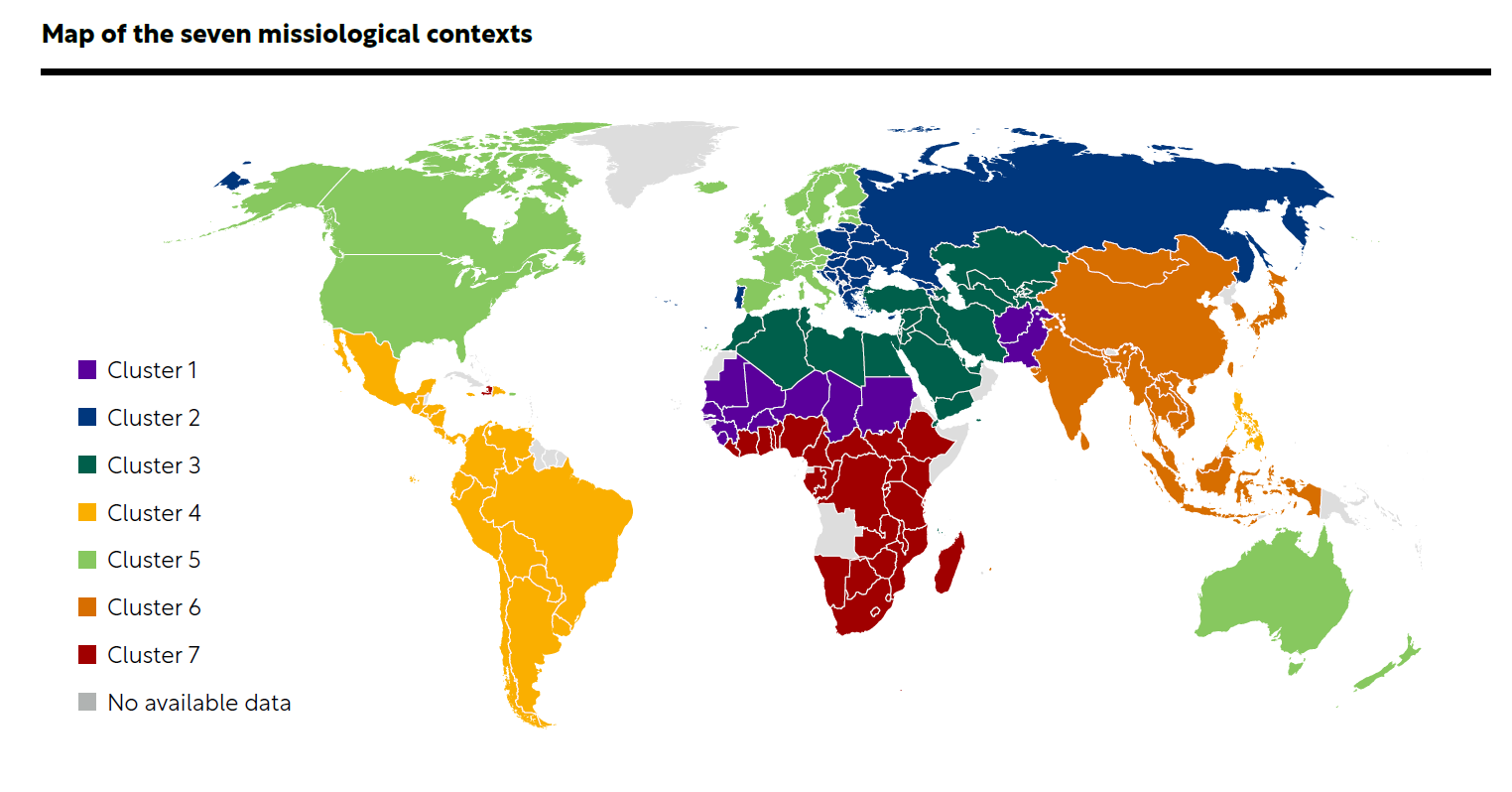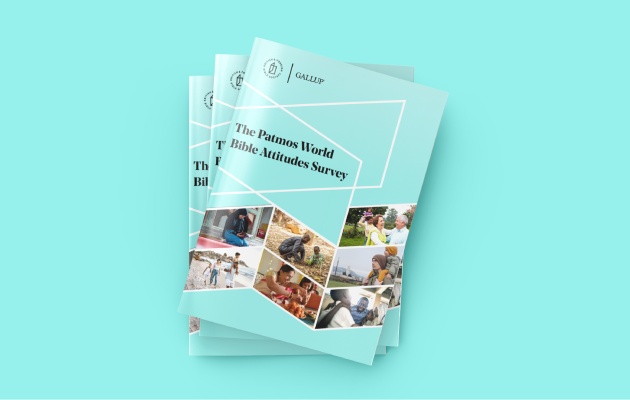20% of non-religious people interested in learning more about the Bible
A macro study by Gallup suggests that secularism in Western Europe is failing to curb Generation Z's spiritual interest. In Eastern Europe, those who reject the Bible outright coexist with those who consider Scripture to be a moral authority.
08 MAY 2025 · 13:14 CET

‘Today, most people with a smartphone can access the Bible, but are they engaging with it?’ This is one of the questions that has prompted a global macro study.
Commissioned by the British and Foreign Bible Society, the prestigious pollster Gallup asked more than 91,000 people in 150 countries and 89 languages about their attitudes toward the Bible and religious behaviour.
Its methodology was to group countries into six ‘clusters’, that is, societies that share cultural and religious trends.

The world, divided into 6 clusters. / Patmos World Bible Attitudes Survey, British and Foreign Bible Society and Gallup. In its general findings, the Patmos World Bible Attitudes Survey states that "eight out of ten people globally believe in God or a '“higher power'". This confirms other data published in the last decade that categorically refute the idea promoted by certain philosophers at the beginning of the 21st century that the world would become less religious.
Interviews around the world show that "Christians in Latin America and Sub-Saharan Africa show the highest use and confidence levels in the Bible".
But even among those worldwide who do not consider themselves religious, one in five (20%) said they were "interested in learning more about the Bible".
Another finding that confirms the spiritual shift pointed to by several other recent studies on Generation Z is that "Christians aged 18–24 have the highest confidence levels in telling the story of the Bible, finding passages relevant to specific situations, and talking with friends and family about the message of the Bible".
Evangelical Focus has looked more closely at the data provided by the Patmos Survey on eastern and south-eastern Europe (the so-called 'cluster 2') and western and northern Europe (which the authors have combined with North America and Australia to form 'cluster 5').

The report can be downloaded here. Eastern Europe, a mix of religion and rejection
"In central and eastern Europe, we see the biggest disparity between the importance of religion and belief in God. Thirty-nine per cent say religion is an important part of their daily life, but 80% say they believe in God or a 'higher power'", the authors summarise.
The 11 countries analysed in this block are Albania, Bulgaria, Hungary, Lithuania, North Macedonia, Poland, Portugal, Romania, Russia, Serbia and Ukraine.
"Engagement with the Bible varies significantly across the large Christian populations in this cluster, from actively engaged to not engaged but interested, to indifferent and closed to the Bible. However, at least some portion of the population in all segments sees the Bible as a useful guide to distinguishing right from wrong", says the report.
77% in these countries still say they are Christian (well above their Atlantic neighbours), although only 40% admit that faith makes a difference in their daily lives.
57% are interested in learning more about the Bible and 68% believe it is good for children to know Bible stories.
However, 63% consider faith to be a private matter that should not be shared with others.
The countries with the highest number of respondents who are "active and confident in talking about the Bible" are Romania (34%) and Portugal (28%, included in this cluster because, despite being in the west of Europe, it shares cultural and religious characteristics with countries further east).
The countries where most people have some influence from Christianity but hardly ever go to church or read the Bible are Russia (26%) and Ukraine (21%). Among this type of person, 74% consider the Bible to be a "useful guide for distinguishing between right and wrong", but 76% also say it is better to "keep their religious beliefs to themselves".
Two out of three Muslims interviewed (many in Albania) say that religion is important in their lives, and 67% of these Muslims agree that the Bible helps to distinguish between good and evil. However, only 13% have a copy at home.
Finally, another 9% of those surveyed in these countries "are almost completely closed to the Bible, with no interest in learning more about it". This profile is most prevalent in Lithuania (26%), Serbia (12%) and Bulgaria (11%).
Western Europe: secularism can’t stop openness to faith
Christian commitment figures are down in the 13 Western European countries analysed (Austria, Belgium, France, Germany, Ireland, Italy, the Netherlands, Norway, Slovenia, Spain, Sweden, Switzerland and the United Kingdom), which together form “cluster 5” alongside North America (Canada, United States) and Australasia (Australia, New Zealand).
In these countries, the percentage of people who consider religion to be important in their daily lives falls to half the global average (40% compared to 80%). However, two out of three respondents (63%) say they ·definitely or probably believe in a higher being·.
53% identify as “Christian” and 44% are placed by the authors in the categories of “closed, sceptical or indifferent”. The report identifies the strongest commitment to the Christian faith and openness to talking about the Bible in the United States (27% of respondents) and Italy (15%).
At the other end of the spectrum, there is a sceptical rejection of the Bible in Norway (33%), Sweden (30%), the Netherlands (25%) and Switzerland (24%), all countries with a clear Protestant heritage but which have experienced strong secularisation in recent decades.
In the world's most developed and economically advanced countries, the percentage of young people described in the report as "active-uncertain" is striking. These are people who are interested in learning more about the Bible (77%) and define it with words such as ‘wisdom, guidance, important’, despite having doubts about its personal or social relevance. Interestingly, almost half of those who identify themselves as very open to exploring the Christian faith are young people between the ages of 18 and 34 (48%), an interest that drops to 29% among people between the ages of 35 and 54, and to 22% among those over 55.
This increase in interest in the Christian faith among Generation Z contrasts with their low nominalism compared to older age groups, in which many more respondents say they are Christian but rarely attend Christian services or read the Bible.
Join us to make EF sustainable
Learn all about our #TogetherInThisMission initiative here (English).
Published in: Evangelical Focus - world - 20% of non-religious people interested in learning more about the Bible
